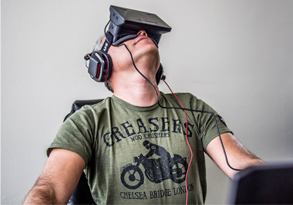© 2014 The Texas Lawbook.
By Jeff Bounds
Staff Writer for The Texas Lawbook
(June 18) – Like any business involved in disputes over trade secrets, the Richardson video game developer id Software LLC and its Maryland-based parent, ZeniMax Media Inc., will face something of an uphill climb in proving their case, legal experts say.
But based on a complaint that ZeniMax and id filed in late May against California-based Oculus VR Inc. and its founder, Palmer Luckey, it appears the plaintiffs believe they have strong evidence on their side and are ready to go to the mat, experts say.
In a highly detailed, 46-page complaint, ZeniMax laid out how it supposedly provided a range of technical trade secrets and other know-how to Oculus in the latter’s building of a virtual reality gaming system – only to receive zero compensation for its efforts.
In addition, at least six employees of the ZeniMax/id business have resigned to take jobs with Oculus, court records say. That group includes John Carmack, who became Oculus’ chief technology officer after a 20-year run at id that included spearheading such major gaming titles as Quake and Doom.

Oculus subsequently agreed earlier this year to sell itself to Facebook for about $2 billion, court records say.
“In a lot of cases, it’s unclear in the complaint what the people who are suing are saying is a trade secret,” said one legal expert who requested anonymity in exchange for frank comments. ZeniMax “provided a list of what they considered trade secrets.”
Indeed, the complaint rattles off a list that includes “copyrighted computer code,” specially designed sensors and other hardware, and programmed software for technical chores such as sensor and optical components calibration, latency reduction and chromatic aberration reduction.
This expert added: “The complaint, from only one side of the (matter), is a compelling story.”
Darin Klemchuk, managing partner of Dallas’ Klemchuk Kubasta, echoed that sentiment.

“It’s one of the more thorough complaints I’ve read,” he said. “Assuming the allegations in the complaint are true, I think the potential for damages is pretty strong.”
Klemchuk believes the suit has the potential to impact Oculus’ transaction with Facebook. “That may be leverage to get a settlement done,” he said.
Like other experts, Klemchuk noted that Oculus hasn’t told its side of things yet. In a press statement, Oculus flatly denied any wrongdoing.
“The lawsuit filed by ZeniMax has no merit whatsoever,” Oculus’ statement says. “As we have previously said, ZeniMax did not contribute to any Oculus technology. Oculus will defend these claims vigorously.”
A Facebook spokeswoman declined comment. So did the legal team representing ZeniMax and id, which is led by Haynes and Boone partner Phillip Philbin.
Details, details
Oculus’ stance that ZeniMax and id provided no contribution to Oculus’ technology system – called the Oculus Rift — is the polar opposite of what the plaintiffs are alleging.
For instance, the complaint points to:
• A YouTube video from the QuakeCon 2012 show in which Luckey, while appearing on a panel, praised Carmack (who was still employed at id at the time). “I can’t do software at all,” Luckey said, according to the video. “So it’s really amazing to have so many people that are interested in a hardware platform because I can’t do that, at all, and it’s so exciting to see that people are into it.”
• Also at that QuakeCon show, Oculus, “lacking sufficient virtual reality expertise, could not get the modified Rift to function properly without ZeniMax’s technical assistance.” The complaint shows a black-and-white photo of Carmack supposedly helping get the “modified Rift to function for Luckey.”
• Also in 2012, Oculus, in a video for a fundraising campaign on the crowdfunding website Kickstarter, supposedly used several clips of a ZeniMax game, “Doom 3: BFG Edition.” Oculus did this after ZeniMax told Oculus not to, and in “blatant disregard of ZeniMax’s rights,” the complaint alleges.
• After recruiting Carmack, Oculus representatives acknowledged at a September 2013 press conference Carmack’s “enormous contribution” to the Rift while he was a ZeniMax employee, the complaint says. The court filing quotes an unnamed Oculus representative as saying Carmack “was an integral part of the project early on.”
Generally speaking, the anonymous legal expert said, if a company provides lots of details in a trade secret complaint, it means one or possibly two things:
• The plaintiff is trying to secure publicity for its claims, and/or;
• It’s trying to put pressure on the other side. “They’re sending a signal that we’ve got our case put together already, so you need to come to the table,” the expert said.
The flip side of that strategy is that the defendant can bring out a different side of the story and say, “Look at how many things the plaintiffs took out of context, and how many things they didn’t tell you.”
But, the legal expert noted, “I don’t know if Oculus has something to say” on that front.
For its part, Oculus will try to show that each alleged trade secret was not secret or proprietary to ZeniMax; was not disclosed to Oculus by ZeniMax; or was independently developed by Oculus personnel who had no access to ZeniMax’s disclosures. That’s according to Daniel E. Venglarik, a partner in the intellectual property section of Munck Wilson Mandala in Dallas.

“In this case, Oculus may make much of that fact that ZeniMax’s subsidiary, id Software, was known in the industry primarily as a (personal computer) game developer, not as a developer of gaming consoles or equipment, and that Oculus was working with that subsidiary to make its virtual reality headset work with the game(s) published by id Software,” Venglarik said in an email.
“With such a sense of the relative roles of the players,” he added, “the jury could find it less credible that ZeniMax and not Oculus developed the technical solutions which improved the Oculus Rift virtual reality headset. Oculus will also likely point to its other development partners and to pre-existing (virtually reality) technology to contest the allegation that ZeniMax was the source of any solutions used.”
Is contract claim the best bet?
ZeniMax’s complaint alleges that the business provided its trade secrets to Oculus under a non-disclosure agreement that it entered into with Luckey. Although ZeniMax is suing for causes of action that include copyright infringement, trademark infringement and common law misappropriation of trade secrets, at least one expert thinks that its breach of contract claim could prove to be its strongest.
“If ZeniMax can show that Luckey violated the terms of the non-disclosure agreement by disclosing confidential information, then ZeniMax can recover damages and attorneys’ fees,” says Adam Sanderson, a Dallas-based partner at Reese Gordon Marketos. “Under the circumstances, it is not especially clear that ZeniMax could recover its attorneys fees under its other claims. Establishing breach of a non-disclosure agreement is often easier to do than proving copyright infringement or trade secret misappropriation.”

For instance, Sanderson, a former programmer, notes that “it is highly likely that Oculus is busy re-writing the source code for the Rift.
“There are almost always two or more ways to accomplish the same thing through source code, so a claim for software theft is often a race,” he said. “The plaintiff is racing to the courthouse and the defendant is racing to re-write the (infringing) code.”
Damages: Eye on the $2B prize
ZeniMax is apparently looking to bracket the valuation of Oculus through the $2 billion valuation that Facebook gave it, on the one hand, and the $2.4 million-plus that Oculus raised through a previous Kickstarter campaign, according to Venglarik.
However, Oculus does not yet have a product ready for market, but instead is currently only taking pre-orders, and only for a development kit, he noted.
“Much work remains to bring the product to market, hurting any claim that ZeniMax should be entitled to a major portion of the Facebook purchase valuation,” Venglarik said.
Meanwhile, gamers are already debating the relative merits – especially in position tracking – of the Oculus Rift versus Sony’s Project Morpheus for the PlayStation 4, he said. Just within the past week, Samsung announced that selected developers are testing its virtual reality headset prototype.
“These factors suggest that the ranges of damages valuations by investment analysts are more likely to be in the tens of millions or even millions than in the hundreds of millions,” Venglarik said.
© 2014 The Texas Lawbook. Content of The Texas Lawbook is controlled and protected by specific licensing agreements with our subscribers and under federal copyright laws. Any distribution of this content without the consent of The Texas Lawbook is prohibited.
If you see any inaccuracy in any article in The Texas Lawbook, please contact us. Our goal is content that is 100% true and accurate. Thank you.
